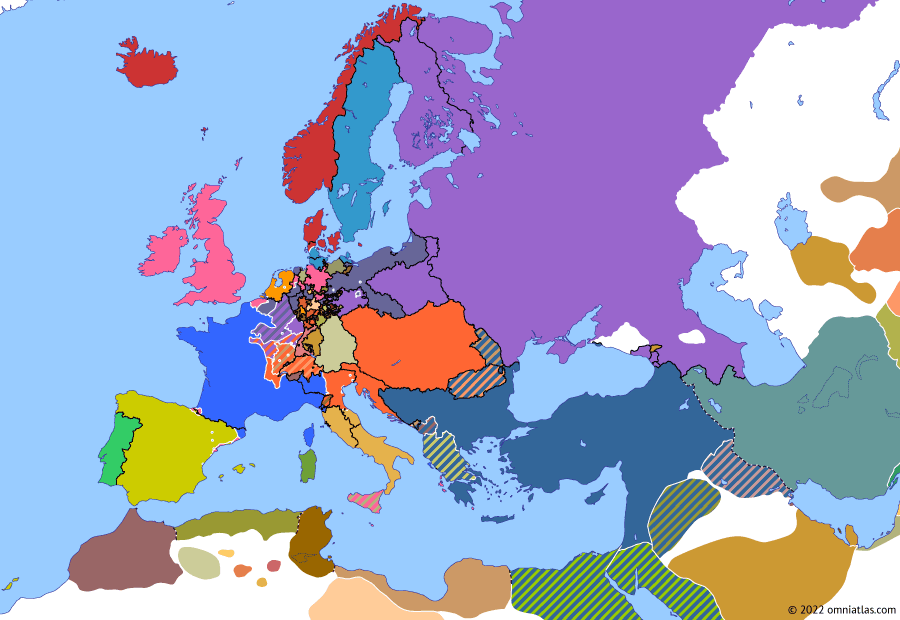Europe 1814: Six Days’ Campaign
10 February 1814
10 Feb 1814
Napoleonic Wars
-27–68 Julio-Claudian Dynasty
68–96 Flavian Dynasty
96–192 Nerva–Antonine Dynasty
192–235 Severan Dynasty
235–268 Crisis of the Third Century: Turmoil
268–284 Crisis of the Third Century: Restoration
284–311 Diocletian and the Tetrarchy
311–363 Constantinian Dynasty
363–383 Valentinianic Dynasty
383–408 Theodosian Dynasty: Divided Empire
408–425 Theodosian Dynasty: The West Besieged
425–441 Theodosian Dynasty: Fall of Africa
441–457 Theodosian Dynasty: Hunnic Wars
457–1803 NO MAPS FOR THIS PERIOD YET
1803–1814 Napoleonic Wars
1814–1815 Vienna and Waterloo
1815–1848 Congress Europe
1848–1850 Springtime of Peoples
1850–1859 Crimean War
1859–1862 Italian Unification
1862–1871 German Unification
1871–1914 Imperial Europe
1914–1918 Great War
1918–1922 Armistice Europe
1922–1939 Rise of Fascism
1939–1942 World War II: Blitzkrieg
1942–1945 World War II: Fall of the Third Reich
1945–1990 Cold War
1990–2010 Post-Cold War Europe
2010–pres Crisis of Europe
Six Days’ Campaign
26 Apr 1809 Fifth Coalition
21 May 1809 Battle of Aspern-Essling
5 Jul 1809 Battle of Wagram
20 Aug 1809 Finnish War
14 Oct 1809 Treaty of Schönbrunn
5 Feb 1810 Siege of Cádiz
9 Jul 1810 Annexation of Holland
13 Dec 1810 Annexation of the Hanse
3 May 1811 Battle of Fuentes de Oñoro
14 Oct 1811 Battle of Slobozia
7 Jan 1812 Siege of Ciudad Rodrigo
16 Mar 1812 Build-up to the Russian Campaign
24 Jun 1812 French invasion of Russia
22 Jul 1812 Battle of Salamanca
14 Sep 1812 French occupation of Moscow
24 Oct 1812 French retreat from Moscow
26 Nov 1812 Battle of Berezina
3 Mar 1813 Sixth Coalition
20 Apr 1813 German Campaign of 1813
4 Jun 1813 Armistice of Pläswitz
21 Jun 1813 Battle of Vitoria
26 Aug 1813 Battle of Dresden
16 Oct 1813 Battle of Leipzig
17 Nov 1813 War of Liberation
11 Dec 1813 Treaty of Valençay
14 Jan 1814 Treaty of Kiel
10 Feb 1814 Six Days’ Campaign
9 Mar 1814 Battle of Laon
11 Apr 1814 Treaty of Fontainebleau
30 May 1814 First Peace of Paris
By 10 February 1814 the advancing Allied armies were approaching Paris but had become separated. Seizing the opportunity, Napoleon attacked and defeated the two armies separately, sending them both into retreat.
